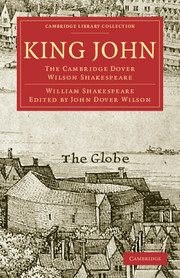THE COPY FOR THE TEXT OF 1623
Published online by Cambridge University Press: 07 September 2010
Summary
The F. text of King John is, on the whole, a tidy one and well printed. Its spelling is comparatively normal, or at least not markedly Shakespearian; its misprints are few; and its punctuation is of the ordinary type found in F. In a word, it differs considerably from texts like Hamlet (Q2), Love's Labour's Lost (Q1), Coriolanus (F.) and Antony and Cleopatra (F.), all of which would appear to have been set up from Shakespeare's own MSS. The inference, therefore, is that the copy used by the compositors for King John in 1623 was either a good playhouse prompt-book or a careful transcript therefrom.
This conclusion tallies with that arrived at, on other grounds, by Dr R. B. McKerrow in an interesting ‘Suggestion regarding Shakespeare's Manuscripts’ published in The Review of English Studies for October, 1935. Dr McKerrow's ‘suggestion’ is that original Shakespearian texts in which the character-names in speech-headings and stage-directions are consistently printed in the same form may be regarded as set up from prompt-books, whereas the copy for texts in which such character-names exhibit inconsistency is probably author's manuscript. Among the former he names The Two Gentlemen of Verona, Twelfth Night, Macbeth and King John, all F. texts, and among the latter Romeo and Juliet (Q2), A Midsummer Night's Dream (Q1), All's Well (F.), and The Merchant of Venice (Q1). I think there is a good deal to be said for this proposed clue for a classification.
- Type
- Chapter
- Information
- King JohnThe Cambridge Dover Wilson Shakespeare, pp. 91 - 94Publisher: Cambridge University PressPrint publication year: 2009First published in: 1936



